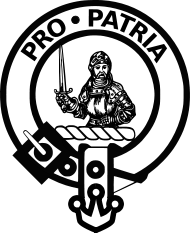Clan Bannerman
| Clan Bannerman | |||
|---|---|---|---|
| Clann Mac a' Bhrataich | |||

Crest: A demi man in armour holding in his right hand a sword, Proper
|
|||
| Motto | Pro Patria ("For my Country") | ||
| Chief | |||
| Sir David Gordon Bannerman of Elsick | |||
| 15th Baronet | |||
| Seat | Elsick House | ||
|
|||
|
|||
Clan Bannerman (Scottish Gaelic: Mac a' Bhrataich) is a Lowland Scottish clan.
The surname Bannerman has its origin in the privilege of the family's ancestors having been the carriers of the royal standard (banner bearers) in the 10th and 11th centuries. The chief's arms also show this honorable office. It is not known exactly when this right passed to the family but according to one tradition it was during the reign of either Malcolm III of Scotland or Alexander I of Scotland. The king is said to have braved the raging waters of the River Spey and Sir Alexander Carron, the king's chamberlain carried the royal standard and the rest of the Scottish army followed. The rebels were defeated and Carron was rewarded by being named the hereditary Standard Bearer to the King. His descendants still bear this privilege.
In June 1367 Donald Bannerman was granted the lands of Clyntrees, Waterton and Weltown in the parish of Ellon, Aberdeenshire from David II of Scotland. The Bannermans were required to build a chapel for weekly mass said for the repose of the soul of David II's father, King Robert the Bruce. The Abbot of Kinloss granted to the Bannermans land lying to the west of the city of Aberdeen in 1370.
The Bannermans became involved in the politics of north-east Scotland which included taking sides in the great feud between the powerful Clan Gordon and their enemies the Clan Forbes during the 16th century. The Bannermans generally supported the Forbeses. However, in 1608 Margaret Bannerman married George Gordon of Haddo, son of Sir John Gordon. George Gordon was a loyal supporter of the king and was later executed for opposing the National Covenant. Alexander Bannerman was also a supporter of Charles I of England against the Scottish presbyterians and his estates were only saved from being forfeited by passing them to his brother-in-law, Sir George Hamilton of Tulliallan.
...
Wikipedia
